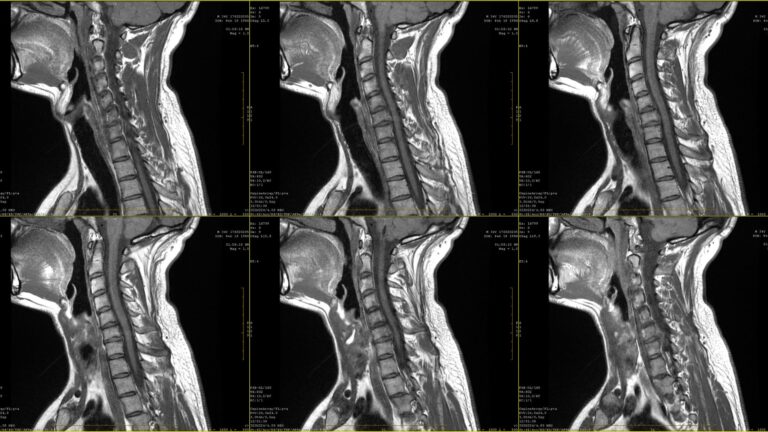Have you ever been having a truly wonderful day and suddenly, everything changes? Maybe you were riding your bike or playing with your kids in the swimming pool. It was a beautiful day until your fingers and arm started to go numb. That tingling sensation, as if your arm had fallen asleep, but it doesn’t go away. Or perhaps you got out of bed, ready to have a great day and you suddenly feel the most awful pain in your back and you can’t even stand up without feeling like you are going to pass out from the pain!
Now, what do you do? Do you wait to see if it will go away on its own? Do you rush over to the emergency room? Do you call your chiropractor or GP?
Everyone will have a different response to this question and there is no absolute “correct” answer that suits everyone. An 80-year old will probably make tracks for the emergency room while a 20-year old will take a wait-and-see attitude.
In fact, a great many people, regardless of age, tend to take a wait and see attitude when it comes to nerve pain, and this can be a dangerous plan of action (or inaction as the case might be) They take some over the counter pain pills like ibuprofen. Why? First, it is because taking ibuprofen or other pain relievers for more than 3 months can cause gastric bleeding. Second, it is because while your symptoms might be a pinched nerve, they might also be something else.
Could this be the first sign of Multiple Sclerosis? A brain tumor? A herniated disc in the neck? Maybe even a lesion on the spinal cord?
Some symptoms are pretty frightening, and most people don’t want to think of the worst-case scenario, but the truth is that, in many cases, you probably are suffering from a pinched nerve.
Symptoms of a Pinched Nerve

Pinched nerves aren’t actually being pinched by some invisible pair of fingers, this phrase refers to nerves that are being compressed or are under pressure, which irritates the nerves and causes inflammation, which leads to pain or other types of symptoms.
Depending on where the pinched nerve is (and there can be more than one pinched nerve) symptoms will vary, but generally speaking, common symptoms include:
- Pins and Needle Feelings- Similar to when your leg or foot falls asleep, but this time, it doesn’t go away in a few minutes
- Numb Areas- Sometimes a certain area doesn’t feel numb, but you have decreased sensation, such as, perhaps you can’t feel a finger slide on your skin, but you can feel a pinch
- A Particular Body Part Falls Asleep Often- If you sit a certain way or rest your arm in one position, it feels as if it falls asleep very quickly
- A Sharp Pain- Especially if it radiates outward, such as down the back of the leg. This pain can sometimes be excruciating!
- A Burning or Aching When You are in a Certain Position
- Muscle Weakness in One Area
- Pain or Tingling that Gets Worse with Certain Movements – Turning your head might cause more of a tingling feeling if the nerve is in the neck or putting weight on one leg might cause your back to hurt more
- The pain becomes worse when you try to sleep
One of the problems is that these symptoms mimic other types of problems, including stroke and Multiple Sclerosis. How do you know which is which?
How Do They Diagnose a Pinched Nerve?
Your chiropractor will first do a full medical history, including all the symptoms that are currently having. The doctor will also ask about your family history.
Usually, imaging tests will be performed at this time, such as x-rays or an MRI. Nerve compression (pinched nerves) is often discovered this way.
It’s important to remember that the symptoms of a pinched nerve might be felt quite a distance away from the actual point of pressure. For example, a nerve in the lumbar spine that is being compressed might be felt in the calves or back of the thigh.
A quick and accurate diagnosis is important to rule out other health issues, such as those mentioned above. It is vital that you discover if what you are feeling is a pinched nerve or something more serious.
What Happens if You Let a Pinched Nerve Go Untreated?
While pinched nerves sound serious, the truth is that they rarely are. Unfortunately, when left untreated, however, permanent nerve damage can occur, including loss of control over bladder and bowel movements or a loss of feeling in the area. This is especially true with pinched nerves in the back.
By the way, there are a few things you should never do if you have a pinched nerve. You can find out about those here.
What Does a Pinched Nerve in the Back Feel Like?

This will depend on which nerve is being compressed. Most pinched nerves in the back are experienced as pain in the lower back, low back/hip area, or as pain that starts in the low back and radiates down the leg.
However, herniated or bulging discs can also cause numbness in the buttocks, down the leg, or even on the bottom of the foot.
So How Do I Make a Pinched Nerve Go Away?
This will depend on the root cause. For some people, the nerve is simply inflamed and irritated from some type of activity. By resting the affected area or not performing the task that irritates it (golfing, running, typing, etc.) the irritation will subside in 4-6 weeks.
Unfortunately, most people cannot take 4-6 weeks off from work or duties at home, which is why getting proper treatment is so important.
How long does a pinched nerve last? If a person is able to avoid irritating the nerve further, almost all cases will fully heal in 6-10 weeks. This seems like a long time; however, chances are that your pinched nerve has been in the making for years, making 6-10 weeks a short period of time.
I Don’t Have 6-10 Weeks! How Do You Treat a Pinched Nerve?

The absolute best way to treat a pinched nerve is through chiropractic care and other modalities.
Pinched nerves are often caused by a joint that is out of place, creating pressure on the nerve, a bulging or herniated disc, or sometimes even tight muscles.
When a chiropractor does alignments to the spine or joints, they can remove the pressure on the nerve. Other modalities that your chiropractor might employ to relieve the pressure and inflammation on the affected nerve(s) include:
- Non-surgical spinal decompression. A computer-operated table gently pulls on the spine to relieve pressure by decompressing the vertebra in the spine. This very gentle technique not only offers relief from pain, but it helps to restore the vertebra to their correct position.

- Chiropractic massage. Muscles, tendons, and other soft tissues can become so tight or out of balance on one side of the body that the nerves become irritated and the joints out of place. Chiropractic massage will relax tight muscles, improve circulation, and allow the lymph system to move more freely, removing damaged tissue and toxins. For pain relief, massage therapy is like no other! Massage also prepares the body for chiropractic adjustments, making them easier to perform and last longer.
- Ultrasound. Sound waves vibrate deep with the tissues of the body, delivering not only pictures but heat and energy. These vibrations reduce inflammation and pain while stimulating the tissues to heal.
- Cold Laser. Also known as low-level laser therapy, the cold laser uses different wavelengths of low-level light, which the tissues of the body absorb. This causes cells to respond with regeneration and repair of damaged tissue, as well as lowering pain and inflammation levels.
Comprehensive chiropractic care is holistic, meaning that they look for the root cause of your pain and treat the entire body, not just the symptom. Almost everyone finds that they can beat the pain of a pinched nerve without addictive drugs, without surgery, and in less time than simply leaving a pinched nerve to heal on its own.

It’s vital that you receive a proper evaluation and diagnosis to ensure that you are not experiencing a more serious condition and that if it is a pinched nerve, you get treatment quickly to avoid complications, reduce pain, and get on the road to recovery quickly!
If you found this article to be helpful, please feel free to pass it on to friends or family or share it on social media.
At Better Health Chiropractic Anchorage, we want you to feel confident that you are getting the best possible treatment available, which is why we have our 3-promise guarantee. If you are experiencing any of the above symptoms or if you are having any type of low back pain or musculoskeletal pain, we encourage you to call for an appointment or click here to make one online.
Our friendly staff will be happy to check your insurance coverage for you and if you don’t have insurance, please read this article.










